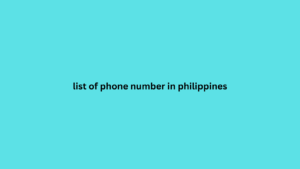Web accessibility from a people perspective
Posted: Sun Dec 22, 2024 4:29 am
Sometimes we take it for granted that all pages meet the minimum web accessibility requirements, but this is not always the case.
Several weeks ago I received a commission for a website for a project and this commission included the request that the website be accessible.
Of course it has to be accessible! But not only this one, all websites should be accessible! Right?
I've never stopped to think about it, haven't you either?
There are no disabled people in my circle and I list of phone number in philippines am afraid that we have to admit that we tend to be oblivious to problems and needs that do not affect us.
I would love to be able to say that I started thinking about web accessibility because of my great sensitivity and capacity for empathy , my principles and values… but that would be untrue.
By making your website accessible, you will not only be making your content reach more people and complying with social responsibility criteria.

It also improves SEO!
So it's worth digging a little deeper into the topic.
Are you in?
What is web accessibility?
It is the quality or qualities that make a website accessible to all people, regardless of their physical conditions.
Accessibility to the offline world was legislated years ago, perhaps not sufficiently, but it was done.
In Spain, for example, the first autonomous community was Navarra in 1988.
From then on, regulations have been established that guarantee (or more or less) web accessibility in cities, buildings, transportation and communication.
The Spanish Constitution advocates a policy of foresight and integration for citizens with some type of physical, mental or sensory disability.
There are other laws and decrees around this idea but it is something theoretical, in practice it is not working that way.
We are used to accessibility elements in the offline world, but there is still a lot to do in the online world.
Web accessibility doesn't make money, in fact, it costs money and makes things quite complicated.
Several weeks ago I received a commission for a website for a project and this commission included the request that the website be accessible.
Of course it has to be accessible! But not only this one, all websites should be accessible! Right?
I've never stopped to think about it, haven't you either?
There are no disabled people in my circle and I list of phone number in philippines am afraid that we have to admit that we tend to be oblivious to problems and needs that do not affect us.
I would love to be able to say that I started thinking about web accessibility because of my great sensitivity and capacity for empathy , my principles and values… but that would be untrue.
By making your website accessible, you will not only be making your content reach more people and complying with social responsibility criteria.

It also improves SEO!
So it's worth digging a little deeper into the topic.
Are you in?
What is web accessibility?
It is the quality or qualities that make a website accessible to all people, regardless of their physical conditions.
Accessibility to the offline world was legislated years ago, perhaps not sufficiently, but it was done.
In Spain, for example, the first autonomous community was Navarra in 1988.
From then on, regulations have been established that guarantee (or more or less) web accessibility in cities, buildings, transportation and communication.
The Spanish Constitution advocates a policy of foresight and integration for citizens with some type of physical, mental or sensory disability.
There are other laws and decrees around this idea but it is something theoretical, in practice it is not working that way.
We are used to accessibility elements in the offline world, but there is still a lot to do in the online world.
Web accessibility doesn't make money, in fact, it costs money and makes things quite complicated.